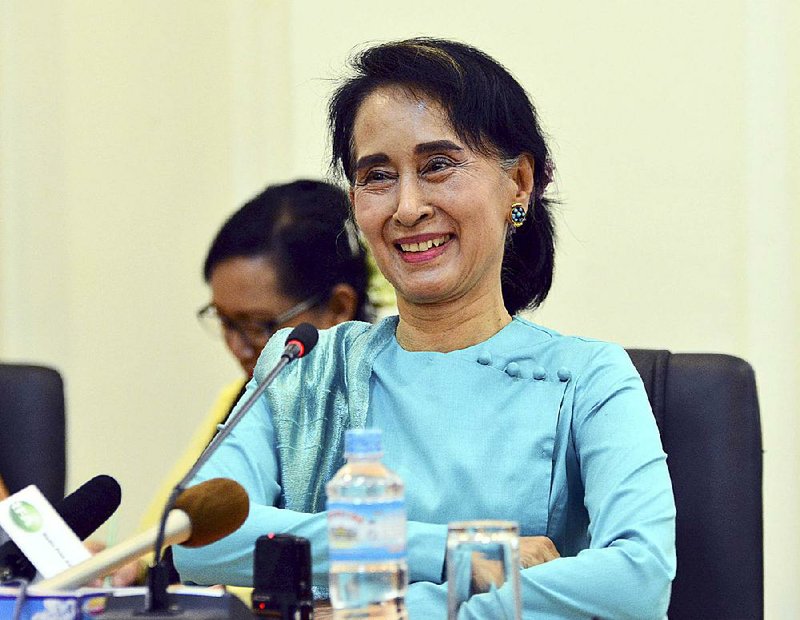BANGKOK -- Burma's military flexed its muscle Thursday, blocking moves to rescind its veto power in parliament and refusing to ease a rule that helps prevent Aung San Suu Kyi, the opposition leader and Nobel laureate, from eventually becoming president.
The votes in parliament were a reassertion of military power in Burma, which was ruled for five decades by the armed forces but has been experimenting in recent years with a more open and democratic system.
Under the constitution, which was written by a junta, the military controls a quarter of the seats in parliament, enough to block any amendments to the charter.
One vote Thursday rejected a proposal to allow the constitution to be amended with 70 percent of votes in parliament instead of the 75 percent now required, a move that would have effectively removed the military's veto.
In another vote, the lawmakers struck down a motion to amend a clause in the constitution that bars anyone whose spouse or children have "allegiance to a foreign power" from becoming president or vice president. Suu Kyi's husband, who died in 1999, and two sons are British citizens.
She would have remained ineligible even if the vote had passed, however, because the proposed amendment only removed the clause relating to a candidate's spouse.
The votes Thursday do not preclude Suu Kyi's party, the National League for Democracy, from winning an election scheduled for this year. The Nobel laureate remains popular in the country and her name -- as well as that of her father, Aung San, the country's independence hero -- remain the most recognizable in the land.
Members of her party said after the vote that their campaign to elect Suu Kyi as president was not over.
"We expected we would lose this vote," said U Win Htein, a member of the party's central executive committee. "We will continue campaigning within parliament and outside the parliament. At the very least, we will be showing people we are trying to amend a constitution that they don't want."
Suu Kyi, who holds a parliamentary seat, took part in Thursday's votes.
Analysts believe her party could have significant bargaining power in the days after the election, which is expected in late October or November. The president and vice presidents are selected by parliament after the election, setting the stage for political haggling between the opposition and the military establishment.
Critics say Burma's military has been out of sync with the democratization of the country. Military commanders have begun offensives against a number of armed ethnic forces, even as peace talks continued. Those talks now seem unlikely to produce a national cease-fire that the government of President Thein Sein has been seeking.
On Wednesday, a military representative in parliament defended the army's prominent role in the country in a speech accompanied by a slide show of tanks and heavy artillery.
"It is necessary to keep the Myanmar military in the legislative and administrative sectors in order to protect and stand by the country in its time of need," news outlets in Burma quoted the lawmaker, Tin Soe, as saying.
Burma is often called Myanmar, a name the ruling military authorities adopted in 1989. Suu Kyi and other regime opponents have refused to adopt the name change, as have the U.S. and Britain.
The reassertion of military power has given rise to pessimism among those who had hoped for a more rapid emergence of civilian control over the country.
"Judging from the votes today, Daw Aung San Suu Kyi should rethink whether she should contest the elections at all," a political commentator, U Yan Myo Thein, said Thursday. "There's no hope that she will become president."
The government, which is made up largely of former military officers, has rolled back some of the freedoms unveiled four years ago when Thein Sein rose to power. Journalists and student activists have been jailed, for instance.
But Burma, which has freed thousands of political prisoners and now courts foreign investment, is nonetheless a radically different place from what it was under the rule of the previous junta.
Information for this article was contributed by Wai Moe of The New York Times.
A Section on 06/26/2015
